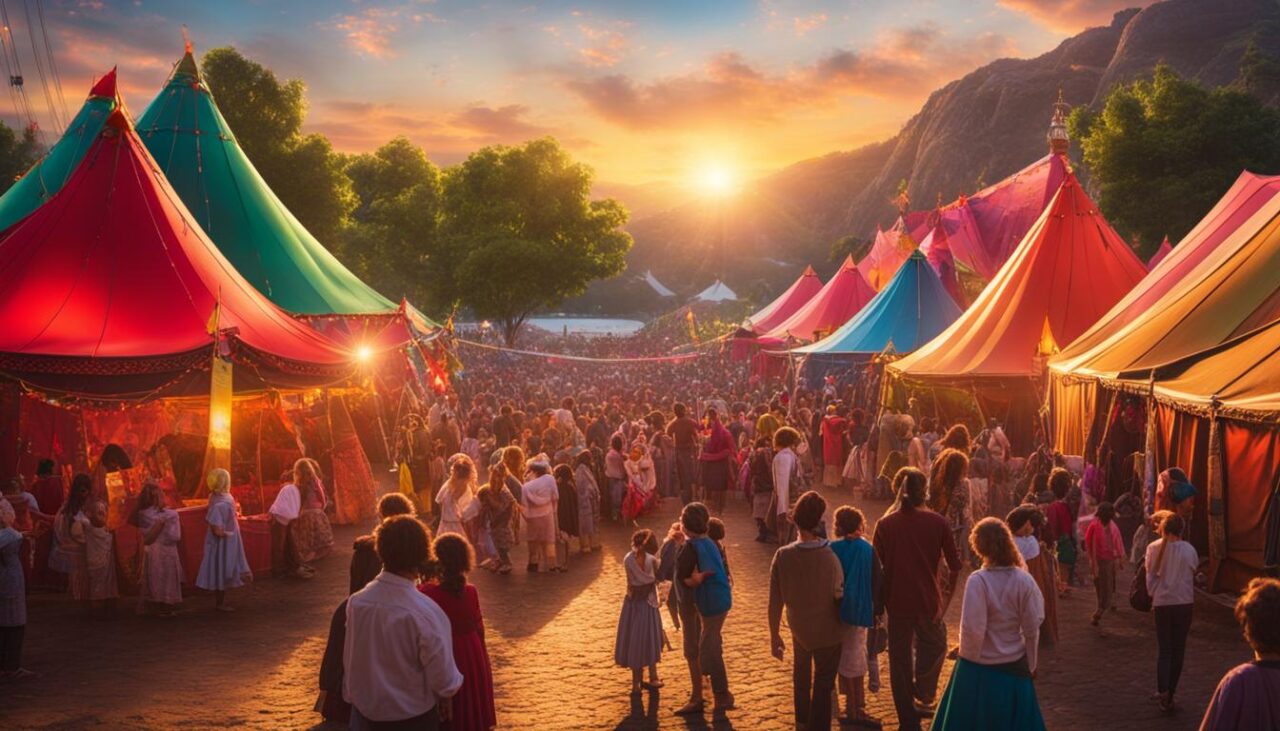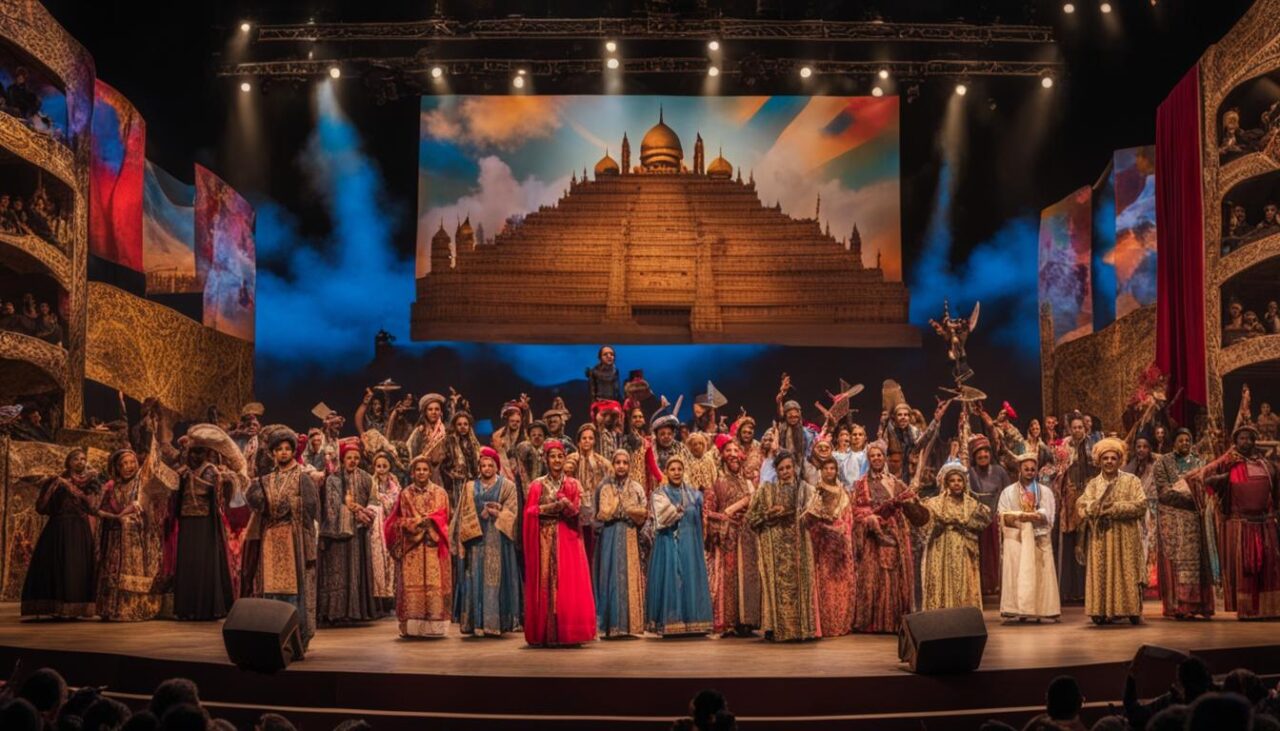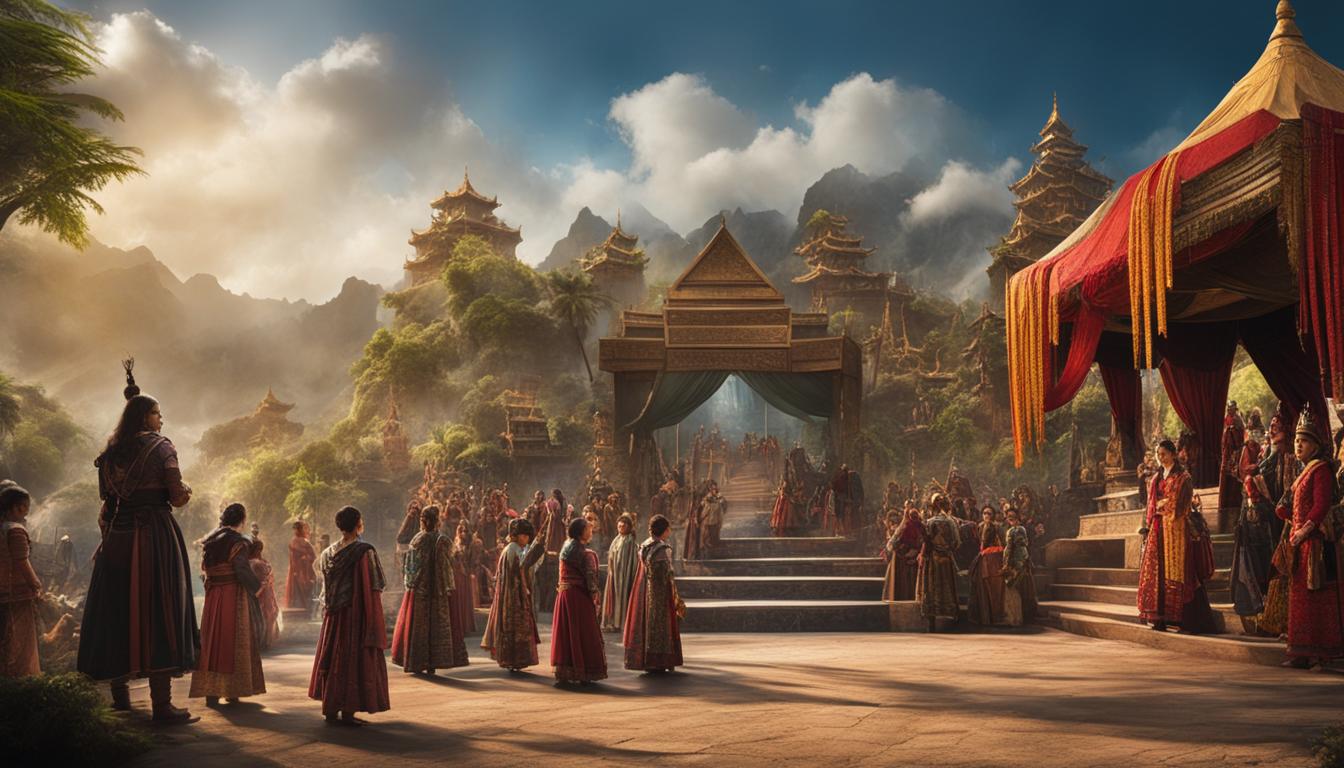The influence of theatre on cultural narratives is truly remarkable. From the ancient Greek tragedies to the contemporary experimental productions, theatre has the power to explore universal themes and emotions through diverse perspectives. In this section, we will explore the profound impact of global theatre on cultural influence. We will delve into the influence of international drama, the rich traditions of theatre from various cultures, and the significance of World Theatre Day in celebrating this global art form. With each stage performance, theatre writers and performers alike continue to showcase the resilience, beauty, and diversity of human expression around the world.
- 1 Key Takeaways
- 2 Understanding Theatre Traditions from Around the World
- 3 Celebrating World Theatre Day: Uniting an Artistic Community
- 4 Theatre History: Tracing the Roots of Global Influence
- 5 Cross-Cultural Plays: Bridging Divides through Theatre
- 6 Contemporary Theatre: Pushing Boundaries and Challenging Conventions
- 7 Conclusion
Key Takeaways
- Theatre has a significant impact on cultural narratives across the world.
- Global theatre includes a broad range of traditions and perspectives.
- International drama plays an essential role in shaping the global theatre landscape.
- World Theatre Day is essential for celebrating and promoting the importance of theatre to diverse communities.
- Theatre's influence on cultural narratives will continue to grow stronger as contemporary playwrights push boundaries to create more innovative productions.
Understanding Theatre Traditions from Around the World
Theatre traditions have played a significant role in shaping cultural narratives across the globe. From African tribal performances to traditional Japanese Kabuki theatre, each region has developed unique styles that reflect their history and traditions. These diverse theatre traditions have contributed to the rich tapestry of global theatre, making it an art form that truly transcends borders.
Cultural influence is a key element of theatre traditions. For instance, in Shakespearean plays, the political and social context of Elizabethan England is evident, while Brechtian theatre is marked by its Marxist ideology. Such influences have helped shape theatre traditions as we know them today.
The impact of theatre traditions is also evident through their continued influence on contemporary theatre. For example, British playwright Caryl Churchill's work draws heavily on the conventions of classical Greek theatre, while Indian director Satyajit Ray's productions are infused with traditional Indian dance forms.
It is essential to acknowledge and celebrate theatre traditions from different regions and cultures, as they have contributed immensely to the global theatre landscape. By understanding and appreciating these diverse styles, we can gain a deeper understanding of the world around us and the stories that shape us.
“The art of theatre has its roots in ancient Greek traditions, but these have merged and evolved across different cultures to create the rich and diverse landscape of global theatre we see today.”
Examples of Theatre Traditions
- Japanese Noh theatre
- Indian Kathakali
- Chinese Beijing opera
- Russian Stanislavski method
- African tribal performances
- English Renaissance theatre
Celebrating World Theatre Day: Uniting an Artistic Community
World Theatre Day is a global celebration dedicated to promoting the exchange of ideas and experiences among theatre professionals and enthusiasts worldwide. Every year, on March 27th, people come together to recognize the art of theatre and its power to stimulate discussions and cross-cultural collaborations.
The importance of theatre festivals around the world cannot be overstated in this regard. These festivals attract varied audiences and showcase diverse styles of theatre, offering a platform for cultural exchange and exploration. The varied interpretations of classic stories provide multiple perspectives on universal themes, such as love, friendship, and conflict, that transcend cultural and geographical boundaries.
“Theatre is a form of knowledge… it should be seen and experienced not simply as entertainment, but as a way of knowing the world.” – Augusto Boal
World Theatre Day represents the unifying force that brings together artists from diverse backgrounds to celebrate and share their love for theatre. It is an opportunity to reflect on the significance of culture and history in shaping the art form we know today. Furthermore, it highlights the ongoing efforts to promote cultural sensitivity and understanding through theatre.
By raising awareness of the importance of theatre and the cultural influences that shape each production, World Theatre Day continues to inspire new audiences, new writers, and performers worldwide. So, let us come together to celebrate this day and appreciate the beauty of diversity that enriches our world.

Theatre History: Tracing the Roots of Global Influence
Theatre has a rich and varied history dating back thousands of years, with its roots firmly entrenched in the cultural narratives of different regions and societies. From ancient Greek tragedies to Shakespearean dramas, the history of theatre spans countless eras and has been shaped by historical events, artistic movements, and diverse cultural influences.
One of the earliest known forms of theatre can be traced back to the religious rituals of ancient Egypt and Greece, where performances were used to communicate with the gods and commemorate important events. The Greek theatre tradition in particular had a profound influence on the development of drama, with plays featuring complex characters, dramatic conflicts, and moral themes.
During the Renaissance era in Europe, theatre experienced a resurgence of popularity, with playwrights such as William Shakespeare creating iconic works that continue to be performed today. The influence of Shakespearean drama can be seen in theatre traditions around the world, demonstrating the enduring impact of this period on the global theatre landscape.
The 20th century saw bold new movements in theatre, with avant-garde and experimental plays pushing artistic boundaries and challenging social norms. One notable example is Bertolt Brecht's epic theatre, which utilized unconventional staging techniques and direct audience engagement to highlight political themes and social justice issues.
Today, theatre continues to evolve and adapt to changing cultural landscapes, with contemporary playwrights exploring diverse perspectives and pushing the boundaries of traditional theatrical forms. As we look back on the rich history of theatre, we can see how its global influence has been shaped by the cultural narratives of different regions and societies, and how it continues to be a powerful force for diversity, empathy, and cross-cultural understanding.
Notable Figures in Theatre History:
- William Shakespeare
- Henrik Ibsen
- August Wilson
- Tennessee Williams
- Lorraine Hansberry
- Bertolt Brecht
- Anton Chekhov
“The theatre is a spiritual and social X-ray of its time.” – Stella Adler
Cross-Cultural Plays: Bridging Divides through Theatre
When it comes to promoting dialogue, empathy, and understanding across different societies, cross-cultural plays hold immense potential. As theatre transcends national boundaries and cultures, it offers a platform for diverse narratives that often go unheard.
One such notable play is The Jungle, written by Joe Murphy and Joe Robertson. The play is based on real-life experiences of refugees and their lives in a Calais camp. Through the story of an Afghan boy, a Syrian girl, and her family, the play highlights the shared humanity and experiences of refugees. It was staged at the Young Vic Theatre in London in 2017, and its success further highlights the importance of cross-cultural plays in bringing people from different backgrounds together.
Another powerful example of cross-cultural theatre is the work of Ping Chong, a theatre director who explores Asian-American identity and the experiences of other underrepresented communities in his plays. Through productions such as Undesirable Elements, where the performers share their personal stories of living as a minority in America, Chong successfully captures the human experiences that unite us all.
Acknowledging the power of theatre to bridge societal divides is crucial in a society that is often polarized along cultural and political lines. Cross-cultural plays have the potential to foster greater understanding and empathy between different communities, and they serve an important role in promoting cultural diversity within the global theatre community.
“Cross-cultural plays have the ability to connect people from different backgrounds on a human level, promoting greater understanding and empathy within society.”

Contemporary Theatre: Pushing Boundaries and Challenging Conventions
Theatre has been a powerful medium for cultural influence, and contemporary theatre continues to challenge social norms and push artistic boundaries. Modern playwrights engage with diverse cultural perspectives to create thought-provoking and impactful productions that address pressing global issues.
Contemporary theatre draws inspiration from a wide range of sources, including film, literature, and the performing arts. Some of the most powerful productions in recent years have tackled sensitive subjects like mental health, sexual identity, and political corruption.
“Contemporary theatre is a reflection of our society, and it's essential that we use this platform to address important issues that affect us all.”
One of the unique aspects of contemporary theatre is its willingness to challenge traditional storytelling conventions. Productions often feature non-linear narratives, experimental structures, and immersive experiences that blur the lines between performer and audience.
Through these boundary-pushing productions, contemporary theatre is raising some of the most pressing issues in the global community. From human rights violations to environmental concerns, the theatre has the power to challenge audiences, provoke thought, and inspire change.
Overall, contemporary theatre is a driving force for cultural influence in the global theatre landscape. As modern playwrights continue to push the boundaries of traditional storytelling, the theatre will continue to be a vital platform for addressing some of the most significant issues facing our world today.
Conclusion
The influence of global theatre on cultural narratives is undeniable. Theatre traditions from around the world have shaped the global theatre landscape and contributed to its cultural influence. World Theatre Day serves as an annual celebration that unites the artistic community and fosters cross-cultural collaboration through theatre festivals.
Cross-cultural plays have a significant role in promoting dialogue, empathy, and understanding across societies, highlighting shared human experiences. Contemporary theatre pushes boundaries, challenges conventions, and addresses pressing global issues, promoting diversity in drama and shaping the future of cultural storytelling worldwide.
As we continue to explore the rich tapestry of dramas performed today, it is evident that the influence of global theatre will only grow stronger. Theatre has a unique ability to connect diverse communities, creating a platform for a deeper understanding of different cultures and promoting diversity in drama. Let us continue to celebrate the power of theatre and its contribution to our cultural heritage.
Contents
- 1 Understanding Theatre Traditions from Around the World
- 2 Celebrating World Theatre Day: Uniting an Artistic Community
- 3 Theatre History: Tracing the Roots of Global Influence
- 4 Cross-Cultural Plays: Bridging Divides through Theatre
- 5 Contemporary Theatre: Pushing Boundaries and Challenging Conventions
- 6 Conclusion

